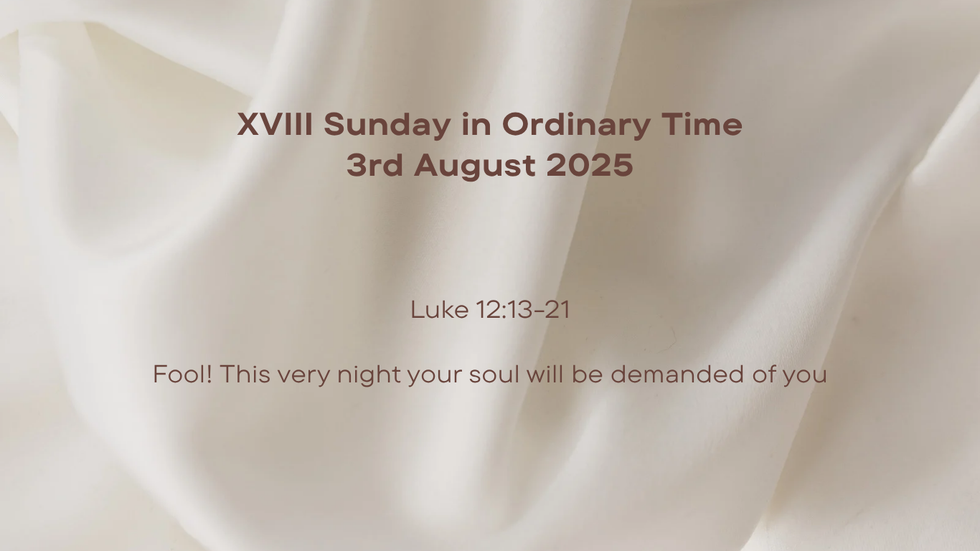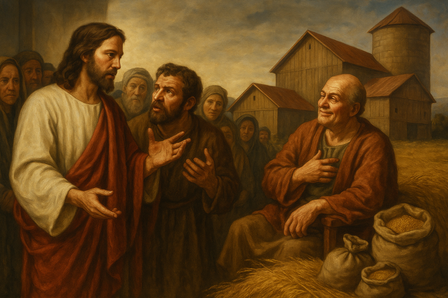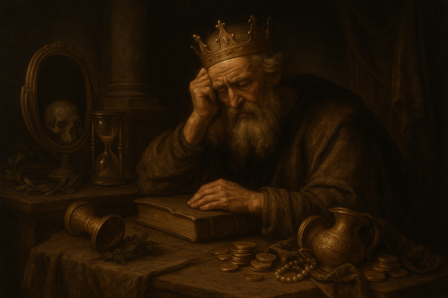

A man in the crowd said to Jesus, ‘Master, tell my brother to give me a share of our inheritance.’ ‘My friend,’ he replied, ‘who appointed me your judge, or the arbitrator of your claims?’ Then he said to them, ‘Watch, and be on your guard against avarice of any kind, for a man’s life is not made secure by what he owns, even when he has more than he needs.’
Then he told them a parable: ‘There was once a rich man who, having had a good harvest from his land, thought to himself, “What am I to do? I have not enough room to store my crops.” Then he said, “This is what I will do: I will pull down my barns and build bigger ones, and store all my grain and my goods in them, and I will say to my soul: My soul, you have plenty of good things laid by for many years to come; take things easy, eat, drink, have a good time.” But God said to him, “Fool! This very night the demand will be made for your soul; and this hoard of yours, whose will it be then?” So it is when a man stores up treasure for himself in place of making himself rich in the sight of God.’
"My soul, you have plenty of good things laid by for many years to come; take things easy, eat, drink, have a good time.”
These words from today’s Gospel of Luke reveal the spiritual blindness of a man filled with pride and selfishness. He believed he had everything—wealth, security, comfort—and his sense of self-sufficiency convinced him he had no need for God. In his pride, he imagined himself the lord and master of his own life.
But God’s response was clear: “Fool! This very night your soul will be demanded of you; and these things you have prepared, whose will they be then?”
His spiritual blindness led him into a trap: he saw himself as his own god, but this was pure illusion.
This parable speaks to all of us. We, too, face the same temptation as the man in the Gospel.
A person might say: I am a believer—I pray, I receive the sacraments, so I am a true Christian. God is close to me. We may feel proud of our dedication to God, thinking it makes us great.
But isn’t this attitude just like that of the man in the Gospel? We may feel secure because we have faith, prayer, and the sacraments. Yet this can easily become spiritual pride.
God reminds us that faith is dynamic. We often experience crises in our faith and commitment. Jesus does not punish us for these but rather uses them to deepen our spiritual lives. If we close ourselves off from God, our hearts become barriers to divine grace. Like the man in the parable, we can become self-satisfied and blind to God’s invitation to openness, living with the illusion that all is perfect. Moral theology calls this the guilt of ignorance: a stubborn spirit that refuses the challenging message of the Lord. Human nature tries to protect a false peace at all costs, avoiding the hard work of growth.
Pope John Paul II, in his encyclical on the Holy Spirit, observed that spiritual poverty is found in the heart that is blind and deaf to God’s voice.
Many saints—though outwardly holy—experienced crises of faith. What did they do in such moments? They sought God more earnestly.
Faith is not a permanent possession, but a gift we must nurture throughout our lives.
Today’s Gospel from Luke is a powerful lesson for us: Be humble. Do not think of yourself as your own god and master. Remember your place—God alone is holy and the source of our spiritual life.
Treat your faith as a lifelong journey, walking always in humility. Amen.
Ktoś z tłumu rzekł do Jezusa: "Nauczycielu, powiedz mojemu bratu, żeby się podzielił ze mną spadkiem". Lecz On mu odpowiedział: "Człowieku, któż Mnie ustanowił nad wami sędzią albo rozjemcą?" Powiedział też do nich: "Uważajcie i strzeżcie się wszelkiej chciwości, bo nawet gdy ktoś ma wszystkiego w nadmiarze, to życie jego nie zależy od jego mienia". I opowiedział im przypowieść: "Pewnemu zamożnemu człowiekowi dobrze obrodziło pole. I rozważał w sobie: „Co tu począć? Nie mam gdzie pomieścić moich zbiorów”. I rzekł: „Tak zrobię: zburzę moje spichlerze, a pobuduję większe i tam zgromadzę całe moje zboże i dobra. I powiem sobie: Masz wielkie dobra, na długie lata złożone; odpoczywaj, jedz, pij i używaj!” Lecz Bóg rzekł do niego: „Głupcze, jeszcze tej nocy zażądają twojej duszy od ciebie; komu więc przypadnie to, co przygotowałeś?" Tak dzieje się z każdym, kto skarby gromadzi dla siebie, a nie jest bogaty u Boga".

„Odpoczywaj, jedz, pij i używaj!”
Te słowa z dzisiejszej Ewangelii według św. Łukasza ukazują duchową ślepotę człowieka pełnego pychy i egoizmu. Wierzył, że posiada już wszystko – bogactwo, bezpieczeństwo, wygodę – i jego poczucie samowystarczalności przekonywało go, że nie potrzebuje Boga. W swojej pysze wyobrażał sobie, że jest panem własnego życia.
Ale odpowiedź Boga była jasna: „Głupcze! Tej nocy zażądają twojej duszy, a to, co przygotowałeś, niczyje będzie?”
Jego duchowa ślepota zaprowadziła go w pułapkę: uznał siebie za własnego boga, ale to była czysta iluzja.
Ta przypowieść przemawia do każdego z nas. My również stajemy wobec tej samej pokusy, co człowiek z Ewangelii.
Ktoś może powiedzieć: jestem wierzący – modlę się, przyjmuję sakramenty, więc jestem prawdziwym chrześcijaninem. Bóg jest blisko mnie. Może pojawić się w nas duma z naszego oddania Bogu, myśląc, że to nas czyni wielkimi.
Ale czy taka postawa nie jest właśnie podobna do postawy człowieka z Ewangelii? Możemy czuć się bezpieczni, bo mamy wiarę, modlitwę i sakramenty. To jednak może łatwo przemienić się w duchową pychę.
Bóg przypomina nam, że wiara jest dynamiczna. Często doświadczamy kryzysów wiary i zaangażowania. Jezus nie karze nas za to, lecz wykorzystuje te momenty, by pogłębić nasze życie duchowe. Gdy zamykamy się na Boga, nasze serca stają się przeszkodą dla Bożej łaski. Tak jak mężczyzna z przypowieści, możemy być zadowoleni z siebie i ślepi na zaproszenie Boga do otwartości, żyjąc w iluzji, że wszystko jest doskonałe. Teologia moralna określa to mianem winy ignorancji: upartego ducha, który nie dopuszcza trudnego orędzia Pana. Natura ludzka broni za wszelką cenę fałszywego spokoju, unikając trudu rozwoju.
Papież Jan Paweł II w swojej encyklice o Duchu Świętym zauważył, że ubóstwo duchowe jest w sercu, które jest ślepe i głuche na głos Boga.
Wielu świętych – choć na zewnątrz wydawali się święci – przeżywało kryzysy wiary. Co robili w takich momentach? Jeszcze gorliwiej szukali Boga.
Wiara nie jest darem na zawsze, lecz darem, który musimy pielęgnować przez całe życie.
Dzisiejsza Ewangelia według św. Łukasza jest dla nas potężną lekcją: Bądź pokorny. Nie myśl o sobie jako o własnym bogu i panu. Pamiętaj o swoim miejscu – tylko Bóg jest święty i jest źródłem naszego życia duchowego.
Traktuj swoją wiarę jako drogę na całe życie, krocząc zawsze w pokorze. Amen.
Add comment
Comments